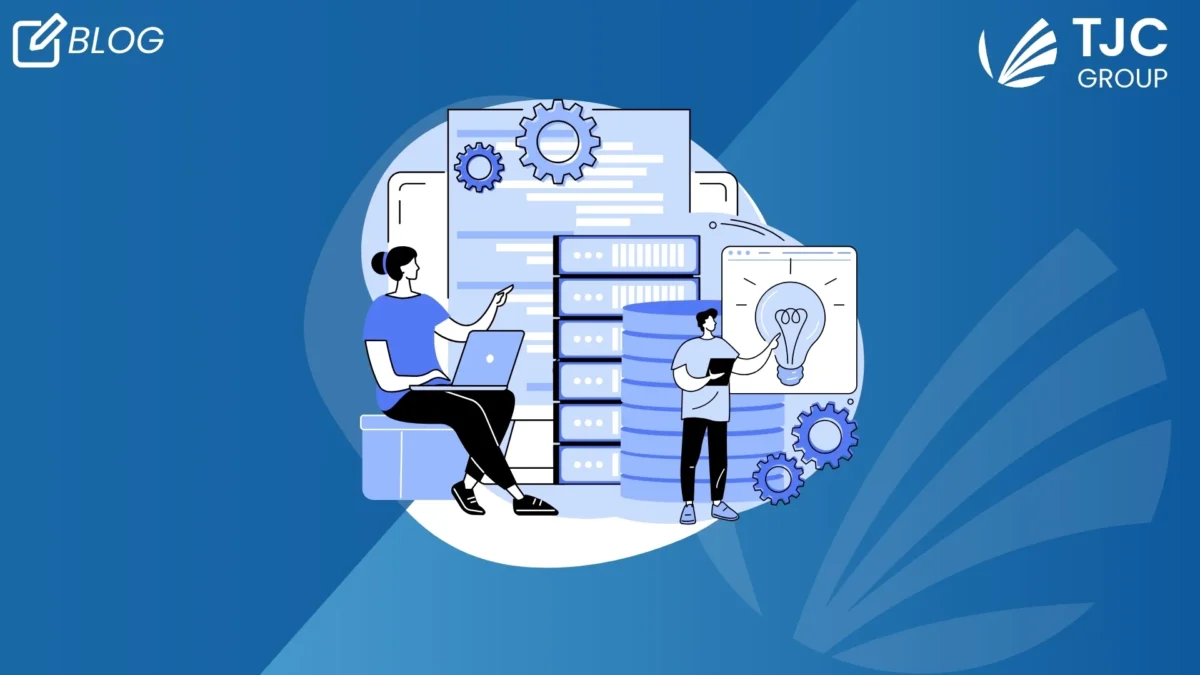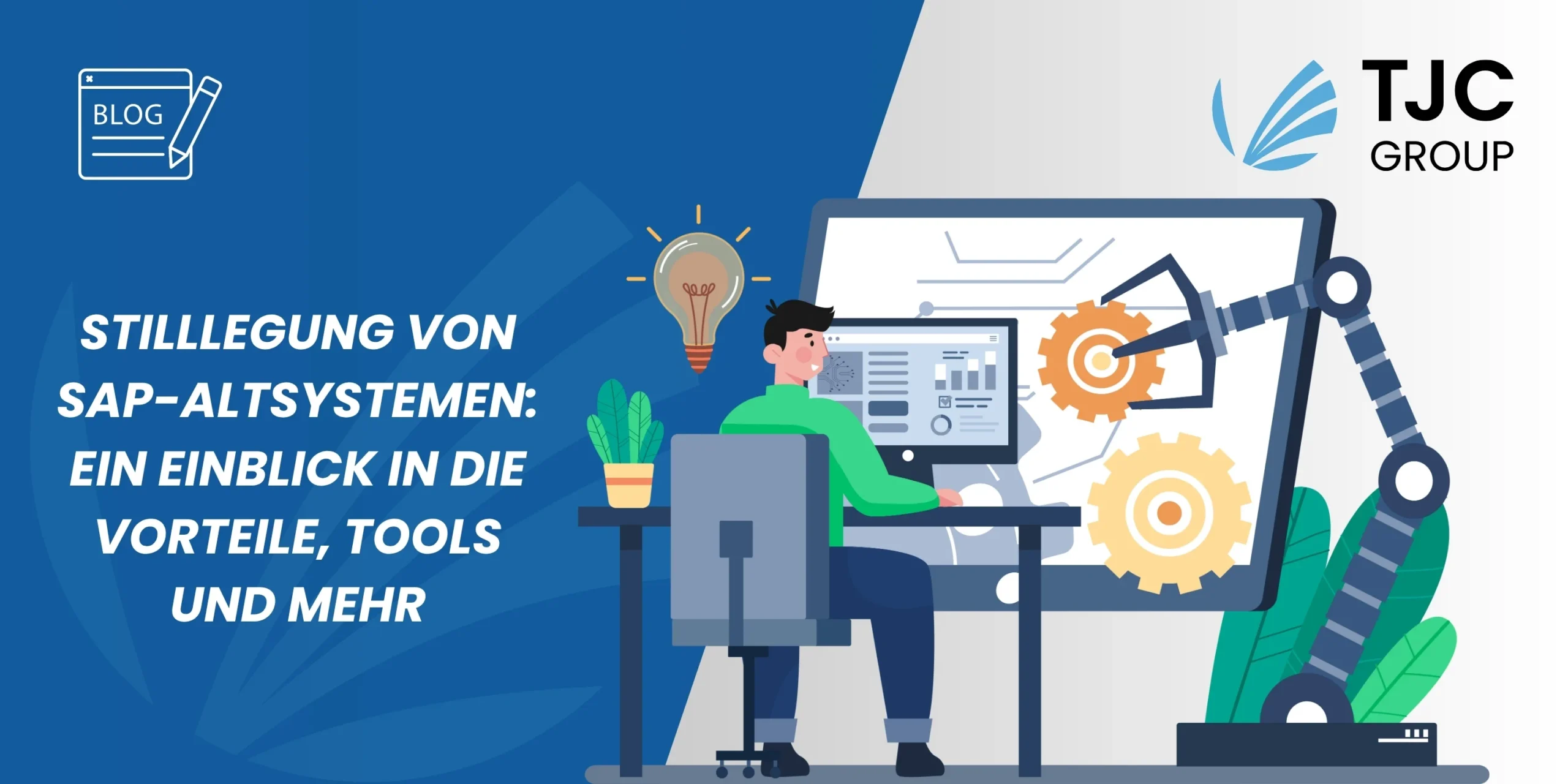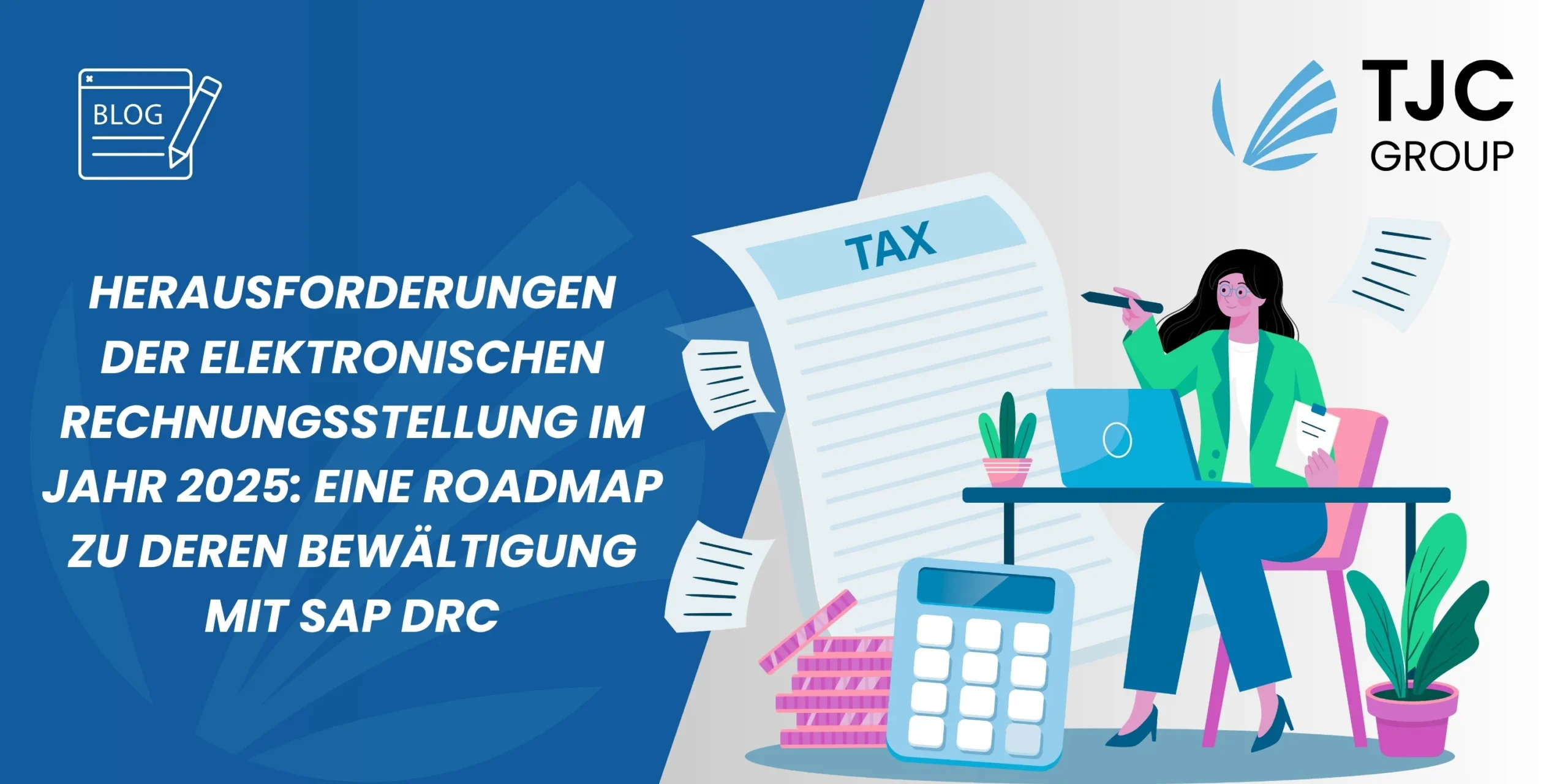Haben Sie schon einmal an eine Verlangsamung der Datenproduktion gedacht? Selbst wenn wir diesen Gedanken haben, ist die Wahrscheinlichkeit, dass er Wirklichkeit wird, gleich null. Sie sind in den letzten Jahren gewachsen, wachsen weiter und werden auch in Zukunft exponentiell wachsen.
Eine Möglichkeit, das Wachstum Ihrer Datenbank zu kontrollieren, ist die Archivierung der Daten. Die effektivste Lösung wäre jedoch, sich für automatisierte SAP-Datenarchivierungslösungen zu entscheiden. In diesem Blog werden wir Ihnen unsere eigene automatisierte Archivierungssoftware vorstellen – das Archiving Sessions Cockpit Lesen Sie mehr!
Inhaltsverzeichnis
- Wachstum der Datenindustrie und des Datenmanagements
- Der Bedarf an automatisierten Lösungen für die Archivierung von SAP-Daten
- Archiving Sessions Cockpit | Ihre Referenzsoftware für die Datenarchivierung
- Unser Ansatz zur Archivierung von SAP-Daten mit ASC
- Der Weg nach vorn
- Häufige Fragen zur Archivierung von SAP-Daten
Wachstum der Datenindustrie und des Datenmanagements
Wie wir in unserem Blog über Datenmanagement und seine Bedeutung erwähnt haben, ist die Gesamtmenge der weltweit erzeugten und verbrauchten Daten bis 2020 auf etwa 65 Zettabyte angestiegen. Prognosen für den Zeitraum 2020-2025 gehen davon aus, dass diese Zahl auf 180 Zettabyte ansteigen wird. Enorme Datenmengen, nicht wahr? Aber haben wir die Speicherkapazität, um solch riesige Datenmengen zu speichern? Tatsächlich wird erwartet, dass die Kapazität der installierten Basis zwischen 2020 und 2025 mit einer jährlichen Wachstumsrate von 19,2 % zunehmen wird.
Allerdings wird nur ein kleiner Prozentsatz der erzeugten Daten aufbewahrt. Die Datenverwaltung ist einer der wichtigsten Aspekte für Unternehmen, unabhängig davon, ob es sich um eine große, mittlere oder kleine Organisation handelt. Aus fiskalischer Sicht erreichte der weltweite Markt für Datenmanagement im Jahr 2022 ein Volumen von 89,34 Mrd. USD, wobei für den Zeitraum 2023-2030 eine Wachstumsrate von 12,1 % erwartet wird.
Faktoren, die zum Wachstum des Marktes für Datenmanagement beitragen
Die Zunahme der Datenmengen ist ein wichtiger Faktor für das Wachstum der Datenverwaltungsbranche. Jedoch tragen auch andere Faktoren dazu bei, wie der zunehmende Übergang von manuellen zu automatisierten Systemen zur Durchführung von Geschäftsoperationen. Darüber hinaus tragen auch zunehmende Sicherheitsbedenken, Risiken und Nachhaltigkeit zum Wachstum des Datenverwaltungsmarktes bei. Was sind also die Techniken des Datenmanagements? Genauer gesagt, gibt es Techniken, die bei der Verwaltung von Daten in SAP-Systemen helfen können? In der Tat, ja! Die Archivierung von SAP-Daten ist eine wichtige Option.
Was ist SAP-Datenarchivierung?
Kurz gesagt, die Datenarchivierung ermöglicht es, das Datenwachstum strategisch zu verwalten und gleichzeitig die Systemleistung zu optimieren. Sie trägt auch dazu bei, eine effiziente Nutzung der Datenressourcen innerhalb der SAP-Umgebung zu gewährleisten. Mit Hilfe der Archivierung können Sie ein Gleichgewicht zwischen der Aufrechterhaltung einer schlanken, hochfunktionalen IT-Struktur und dem Erhalt der notwendigen historischen Daten finden. Zu technisch, um verstanden zu werden? Lassen Sie uns einfach reden.
Stellen Sie sich vor, dass Ihr System die Daten von mehreren hundert Angestellten enthält. Von diesen 100 Personen sind nur 30 von höchster Wichtigkeit – die anderen 70 werden derzeit nicht benötigt (was sie zu historischen Informationen macht). Überschüssige Daten beeinträchtigen jedoch die Leistung Ihres Systems, verringern Ihre Speicherkapazität und erhöhen die Kosten. Was werden Sie dann tun? Ihre Daten löschen? – Das ist nicht möglich, da Sie sie später noch benötigen könnten. Die Daten unverändert lassen und Ihre IT-Landschaft behindern? Auch das ist keine gute Option. Die beste Lösung ist, diese Daten in ein separates System zu übertragen, um sie langfristig zu erhalten. Und genau das tut die Datenarchivierung!
Mit derSAP Datenarchivierung verschieben wir inaktive Daten in ein Langzeitspeichersystem, das bei Bedarf wieder in das Hauptsystem integriert werden kann. Für die Datenarchivierung werden verschiedene Werkzeuge verwendet; in SAP werden das Archiv Development Kit (ADK) und die Archivverwaltung (Transaktion SARA) eingesetzt. Angesichts des weltweiten Automatisierungsfiebers ist eine Software, die Ihren Datenarchivierungsprozess automatisiert, jedoch immer ein Pluspunkt. Dies bringt uns zur nächsten Frage: Ist es notwendig, die Datenarchivierung zu automatisieren? Wenn ja, gibt es Software dafür?
Der Bedarf an automatisierten Lösungen für die Archivierung von SAP-Daten
Mit S/4HANA sind Organisationen bereit, auf ein verbessertes ERP-System der nächsten Generation zuzugreifen, das ihre Geschäftsprozesse weiter rationalisieren wird. Es ist jedoch wichtig, sicherzustellen, dass Sie die Kosten und die Zeit der S/4HANA-Migration durch das Löschen veralteter Daten reduzieren – diese Daten können archiviert oder gelöscht werden, wenn Richtlinien zur Datenaufbewahrung angewendet werden. Während das neueste ERP-System und der HANA-Speicher den Organisationen zweifellos unübertroffene Vorteile bringen werden, ist es zwingend erforderlich, eine geeignete Datenverwaltungsstrategie für die SAP-Systeme zu haben, um niedrigere Gesamtbetriebskosten und eine genaue Datenkonformität zu gewährleisten.
Hier kommen Lösungen für die automatisierte Datenarchivierung ins Spiel. Sie ist nicht nur eine der effizientesten Möglichkeiten, die langfristigen Eigentumskosten der S/4HANA-Migration zu verwalten, sondern spart auch Zeit und mindert das Risiko der Nichteinhaltung von Vorschriften. Sie führt zu allgemeinen finanziellen Vorteilen durch Einsparungen bei Speicherkosten, Wartungskosten und Softwarelizenzkosten. Selbst wenn wir die Kostenvorteile außer Acht lassen, kann die Entscheidung für eine automatisierte Datenarchivierung auch den Fortbestand des Unternehmens sichern. die Sicherheit Ihrer archivierten Daten. Die Archivierung sperrt Ihre Daten im Laufe der Zeit und verhindert, dass andere Anwendungen auf sie zugreifen können. Dies ist ein sehr sicherer Weg, um Daten langfristig zu verwalten. die Anforderungen an die Datenaufbewahrung zur Einhaltung der Rechnungsprüfung. Die archivierten Daten sind sicher, können nicht gehackt werden und werden automatisch so lange aufbewahrt, wie es gesetzlich vorgeschrieben ist.
Archiving Sessions Cockpit | Ihre Referenzsoftware für die Datenarchivierung
Dies ist das Archiving Sessions Cockpit (ASC) – eine Datenarchivierungssoftware, die es Ihnen ermöglicht, den gesamten Prozess zu optimieren und zu automatisieren. Unsere Archivierungssoftware wurde von der TJC Group entwickelt und verwaltet und steuert Ihre Archivierungsvorgänge von einem einzigen Punkt aus.
ASC stellt sicher, dass alle wiederkehrenden Prozesse der SAP-Datenarchivierung eingeübt und perfekt ausgeführt werden. Durch seine Automatisierungsfähigkeiten hilft es, Ihre internen Ressourcen für kompetentere Aufgaben freizusetzen, um in Zukunft eine höhere Rendite zu erzielen.
Die Entwicklung des Archiving Sessions Cockpit
Für Sie und mich mag die SAP-Archivierung nur eine Methode sein, um Speicherkapazität freizusetzen; für Unternehmen ist die Datenarchivierung ein Weg, die Gesamtbetriebskosten zu senken, gesetzliche Anforderungen zu erfüllen, die Sicherheit des Systems und die Vertraulichkeit der Daten zu gewährleisten und vieles andere mehr!
Aber selbst mit Werkzeugen zur Datenarchivierung ist die Aufgabe nicht einfach. Die Organisationen waren es leid, jedes Jahr ein neues Archivierungsprojekt zu starten. Darüber hinaus sind die großen Mengen an internen Daten und das Risiko des Datenverlusts aufgrund von schlecht verwalteten Prozessen zusätzliche Sorgen für die Organisationen. Viele Kunden fragten nach einer Lösung, die ihnen helfen würde, den Archivierungsprozess zu automatisieren. Es musste also ein einfacherer und effektiverer Weg gefunden werden, um den Kunden einen reibungslosen Datenarchivierungsprozess zu garantieren. So begann die Entwicklung des Archiving Sessions Cockpit.
Mit ASC können Sie sich von der komplexen und zeitraubenden manuellen Datenarchivierung, von Verzögerungen bei neuen Investitionen in Hardware usw. verabschieden. Es trägt dazu bei, die Reaktionszeit Ihrer SAP-Systeme zu erhöhen, was die Nutzer des Systems zufrieden stellt.
Funktionen des Archiving Sessions Cockpit
Das erhalten Sie mit unserer SAP Datenarchivierungssoftware – -.
- Das ASC wurde entwickelt, um die Massenarchivierung von Daten zu automatisieren, die anfängliche, regelmäßige und ausgewählte Daten umfasst.
- Es ermöglicht die Planung von Archivierungssitzungen in Synchronisation mit IT- und Geschäftskalendern.
- ASC verwaltet alle Lagerungs- und Archivierungsarbeiten bis zu ihrer Fertigstellung.
- Er stellt Sitzungen automatisch wieder her und startet sie neu, wenn sie unterbrochen werden.
- Das ASC kann detaillierte Archivierungsvarianten verwalten, was eine feine Granularität der Archivierung ermöglicht.
- Er führt Aufzeichnungen zur Rückverfolgbarkeit für die Nutzer.
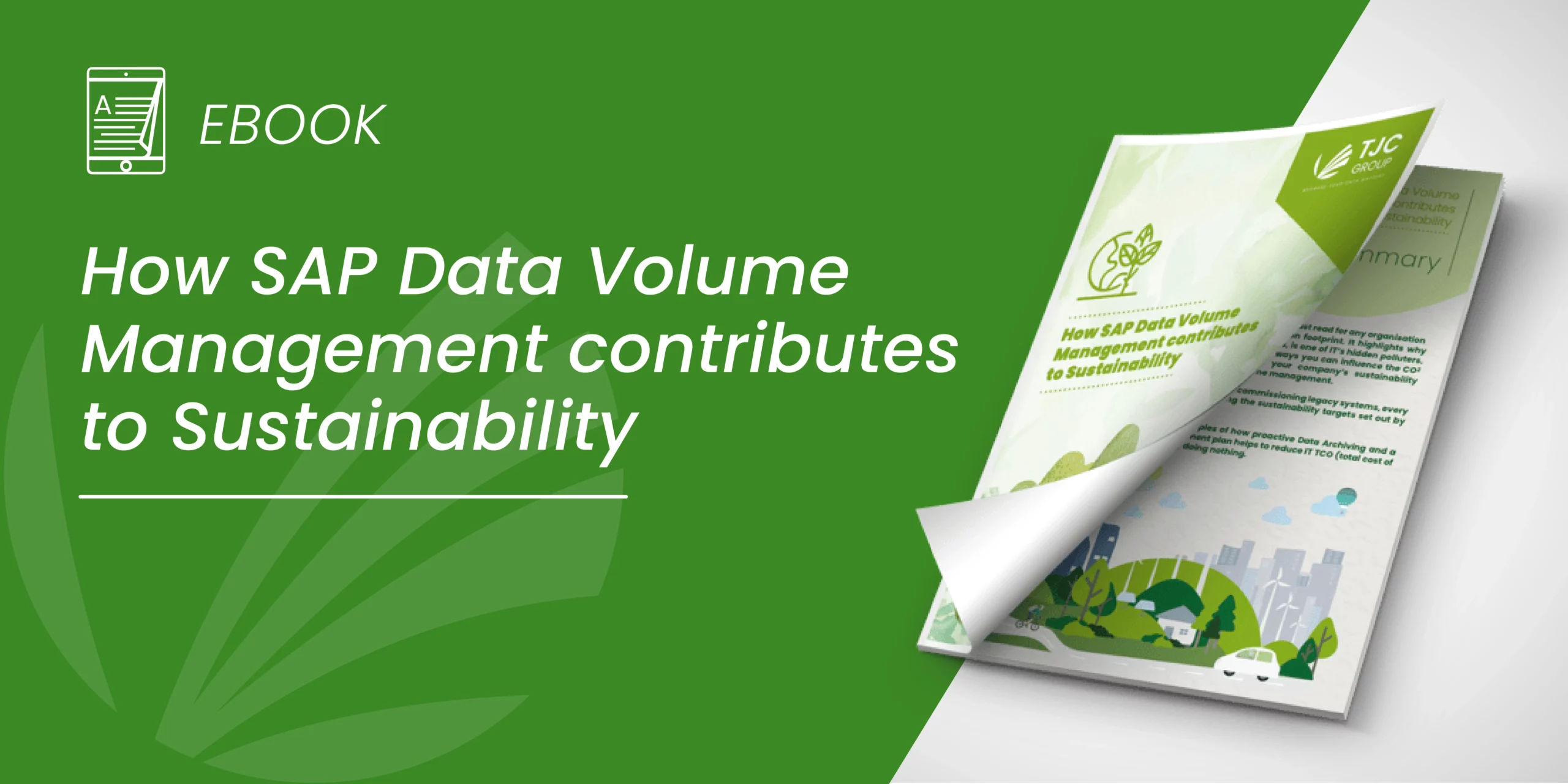
Vorteile des Archiving Sessions Cockpit
Mit ASC genießen Sie die folgenden Vorteile -.
- Unser Archiving Sessions Cockpit verwaltet das Wachstum Ihrer Datenbank vollständig.
- Es verbessert den technischen Prozess der Archivierung von SAP-Daten.
- ASC ermöglicht einen kontinuierlichen Zugang für den Endnutzer, auch wenn die Daten archiviert sind.
- Da der gesamte Prozess automatisiert ist, gibt es keine manuellen Unwägbarkeiten, was einen fehlerfreien Prozess gewährleistet.
- Es ermöglicht, die Errungenschaften des Archivierungsprojekts zu bewahren und gleichzeitig regelmäßige Sitzungen zu ermöglichen, um die Investitionsrendite aufrechtzuerhalten.
- Da ASC die Sitzungen entsprechend den Kalendern des Unternehmens plant, gibt es während der Archivierung keine Unterbrechung Ihrer Aktivitäten.
Unser Ansatz zur Archivierung von SAP-Daten mit ASC
Ein strategischer Weg – unsere Experten führen eine Archivierungsbewertung durch, die den Umfang des Projekts und die erwarteten quantifizierten Ziele definiert. Die Empfehlungen werden umgesetzt und mit Hilfe der Archiving Sessions Cockpit (ASC) Software automatisiert, um eine regelmäßige Archivierung zu gewährleisten, manuelle Fehler zu eliminieren und die besten Archivierungspraktiken zu garantieren.
In einem zweiten Schritt helfen Ihnen unsere Experten, offene Elemente in Ihren SAP-Systemen zu identifizieren; danach wird die richtige Methodik eingeführt, um die Vorteile der Datenarchivierung zu maximieren. Sobald Ihr SAP-Datenarchivierungsprojekt abgeschlossen ist, bieten wir Ihnen einen kontinuierlichen BPO-Service (Business Process Outsourcing) für die Archivierung. SAP ILM und/oder BPO (Business Process Outsourcing) Archivierung, die Ihre Geschäftsprozesse erheblich verbessert. Dieser Service führt monatliche Archivierungszyklen durch, um die Vorteile der wiederkehrenden Archivierung zu maximieren.
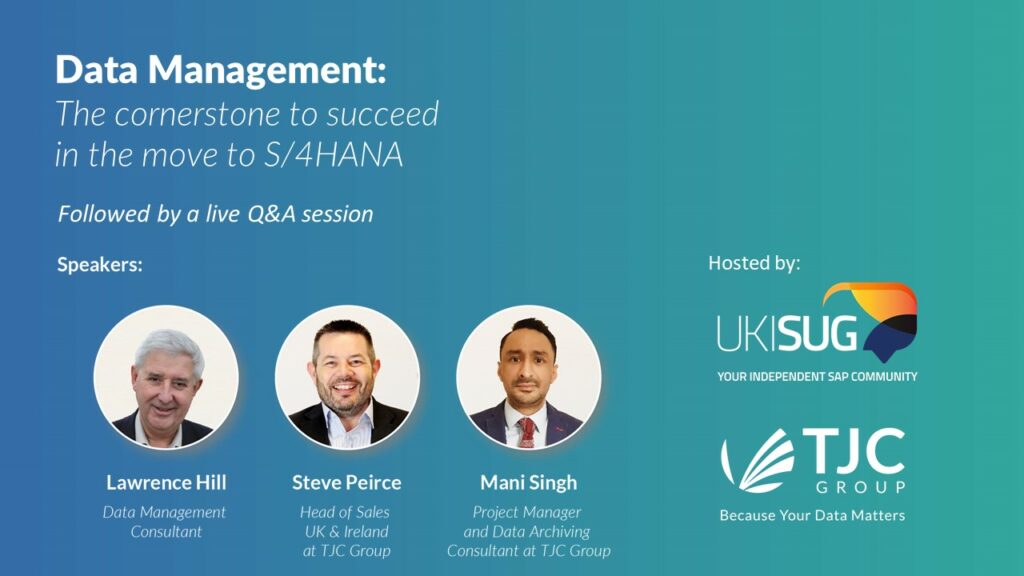
Warum sollten Sie Ihren Archivierungsprozess automatisieren?
Kunden, die Daten mit der ASC-Software archivierten, reduzierten die Größe ihrer Datenbanken und erreichten eine Archivierungsrate von über 95% – was einen deutlich höheren und besseren Wert darstellt. Darüber hinaus ist der Übergang von SAP ECC zu SAP S/4HANA im Gange – der Migrationsprozess nimmt bereits viel Zeit in Anspruch, und mit der manuellen Archivierung kann er noch länger dauern. Durch die Automatisierung Ihres SAP Datenarchivierungsprozesses können Sie die Zeit und den Aufwand für die S/4HANA Migration erheblich reduzieren.
Um mehr über die Vorteile der Archivierung von SAP-Daten bei der Migration zu S/4HANA zu erfahren, klicken Sie bitte hier – https://www.tjc-group.com/blogs/importance-of-sap-data-archiving-when-migrating-to-s-4hana/
Der Weg nach vorn
Das Cockpit für Archivierungssitzungen dient nicht nur zur Archivierung Ihrer inaktiven oder historischen Daten. Sein Automatisierungsfaktor verbessert die Effizienz Ihrer SAP-Geschäftsprozesse, optimiert und bewertet die Daten für eine höhere Zuverlässigkeit der Archivierung.
Wie bereits erwähnt, kann die Archivierung ein komplexer Prozess sein, insbesondere wenn er manuell durchgeführt wird. Als Unternehmer wollen Sie sicherlich keine Schwierigkeiten oder Störungen in Ihren Aktivitäten. Was ist also der nächste Schritt? – Automatisieren Sie Ihren SAP-Datenarchivierungsprozess mit unserer Software Archiving Sessions Cockpit. Profitieren Sie von einem 24-Stunden-Support, einem eng mit Ihnen zusammenarbeitenden Expertenteam, einem BPO-Service und vielem mehr. Kontaktieren Sie noch heute die TJC Group!
Häufige Fragen zur Archivierung von SAP-Daten
Wie wichtig ist das Datenmanagement in der heutigen Wirtschaftslandschaft?
Antwort: Daten sind eines der wesentlichsten Elemente für das Funktionieren eines Unternehmens. Unternehmen benötigen eine Data Governance und vor allem Datenverwaltungsstrategien, um die praktische und effiziente Nutzung von Daten in Mitarbeiternetzwerken, Lieferketten, Partner-Ökosystemen usw. zu gewährleisten. Datenmanagement ist jedoch in der heutigen Geschäftslandschaft von entscheidender Bedeutung, um die zunehmenden Cyberbedrohungen einzudämmen und die sich ständig ändernden Datenschutzbestimmungen einzuhalten.
Wie trägt die Archivierung von SAP-Daten zur Einhaltung gesetzlicher Vorschriften bei?
Antwort: Unternehmensdaten helfen dabei, einen zentralen Rahmen für die Verwaltung und Steuerung von Daten in der gesamten Organisation zu schaffen. Tatsächlich ermöglichen sie es Organisationen, Datenrichtlinien zu definieren und umzusetzen und so die Einhaltung der gesetzlichen Anforderungen und der internen Datenverwaltungsstandards zu gewährleisten.
Durch die Archivierung von Daten können Organisationen angemessenere und effektivere Richtlinien für die Datenverwaltung umsetzen, die Richtlinien für die Aufbewahrung von Daten klarer definieren und Regeln für den Zugriff auf Daten und deren Löschung aufstellen.
Können die archivierten Daten bei Bedarf leicht abgerufen werden?
Antwort: Ja, mit effektiven Datenarchivierungsstrategien können Unternehmen sicherstellen, dass die Daten im Bedarfsfall problemlos wiederhergestellt werden können. Durch die Implementierung einer geeigneten Archivierungsstrategie für SAP-Systeme können Unternehmen sicherstellen, dass die archivierten Daten organisiert und zugänglich bleiben und gleichzeitig die Datenintegrität gewahrt wird. Denken Sie daran, dass eine erfolgreiche Archivierung nicht auf die Speicherung von Daten beschränkt ist, sondern eine starke Strategie erfordert, die durch geeignete Werkzeuge und häufige Bewertungen unterstützt wird, um den sich ändernden Geschäftsanforderungen und Compliance-Standards gerecht zu werden.



